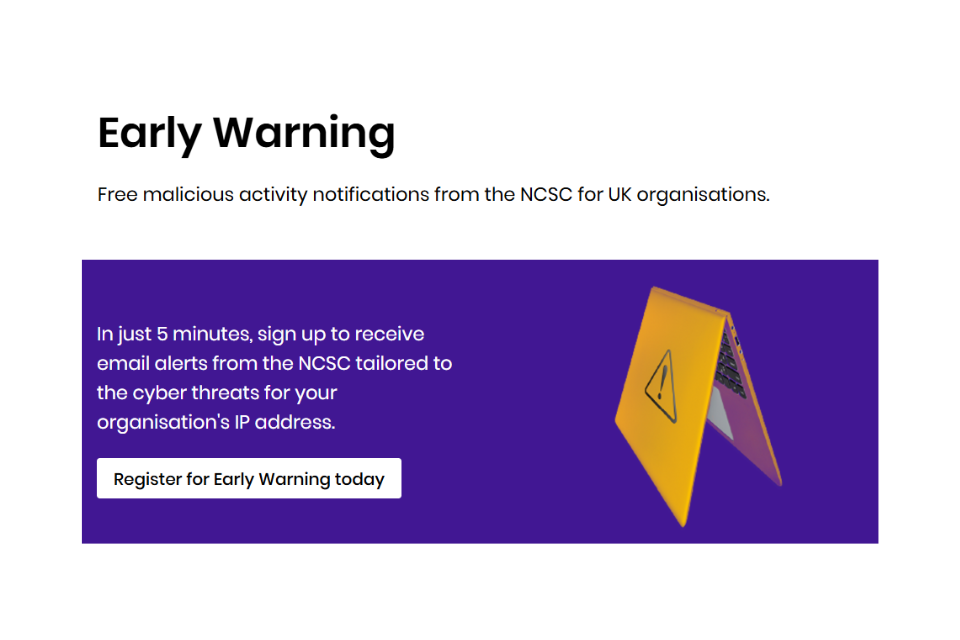
April 28th 2025
As care providers, you rely on digital systems every day – to store care plans, communicate with families, manage medication records and more. But these systems are increasingly being targeted by cyber criminals. That’s why the National Cyber Security Centre (NCSC) offers a free service to help protect organisations like yours: the Early Warning system.
It alerts you to potential cyber attacks on your systems as soon as possible – so you can take action quickly, keep your data safe, and continue to provide great care.
What is the Early Warning system?
The Early Warning system is a free service from the NCSC. It looks out for signs that someone might be trying to access or attack your network. It does this by collecting trusted data from a wide range of sources, including internet service providers, threat intelligence feeds, and government partners.
If the system spots suspicious activity linked to your internet connection – such as malware infections, signs your systems have been compromised, or attempts to access your network from known malicious sources – you’ll get an alert by email.
It won’t stop the attack for you, but it gives you a heads-up so you can act fast.
Why it matters for adult social care
Cyber attacks are a growing risk for adult social care providers. Many services have already been affected by phishing emails, ransomware, or unauthorised access to sensitive data. These attacks can lead to care disruption, distress for the people you support, reputational damage, and costly downtime.
The Early Warning system helps you:
- Know what’s happening – see if your systems have been targeted or infected.
- Act fast – receive alerts early so you can take action before serious harm is done.
- Strengthen your defences – use the information in the alerts to fix any weaknesses in your systems.
It’s a simple way to make your organisation more cyber secure—without costing you a penny.
What kind of alerts will I get?
Once you’ve signed up, you’ll receive alerts about three main types of activity:
- Incident notifications – for example, if a known piece of malware is seen on your network.
- Network abuse – such as if your systems are being used to send out spam or attacks to others.
- Vulnerabilities and open ports – if your systems are exposed in ways that attackers could exploit.
Each alert includes technical details about what’s been detected and what you can do about it. You can pass these on to your IT support or technology provider so they can take action.
How to register
Registering is quick and easy:
- Go to the NCSC Early Warning website.
- Click ‘Sign up’.
- You’ll need to enter your organisation’s IP addresses and domain names. If you don’t know these, ask your IT provider—they’ll be able to help.
You’ll then start receiving alerts relevant to your systems. You can manage your preferences at any time.
What happens after signing up?
Once you’re signed up, you’ll start getting alerts by email when there’s suspicious activity affecting your organisation. You’ll also receive regular updates, even if no issues are found – so you know the system is working.
The NCSC won’t collect any personal data or monitor your systems directly. They simply match technical information from trusted sources against the details you provide when you sign up.
Helping you stay one step ahead
Cyber threats aren’t going away – but there are simple steps you can take to reduce your risk. Signing up to the Early Warning system is one of them. It helps you stay informed, protect your data, and deliver care with confidence.
At the Digital Care Hub, we strongly encourage all care providers to take advantage of this free support tool. It’s an easy way to stay a step ahead of cyber criminals and show that you take data security seriously.
It’s free, easy to use, and built to help organisations just like yours. If you haven’t already, sign up today:
👉 Register for the NCSC Early Warning system
View all News